As a traveller, one thing that is certain is that you are going to be sleeping in many different places. With this comes risk, one of which is to wake up one morning covered in tracks of red bites – the possible mark of bed bug bites!
Of course, your initial thought may be that you’ve been the victim of a highly trained vicious mosquito squadron. But look a little closer – because you may have been the victim of something else entirely, something that is going to get fellow travellers all terribly excitable and probably freak you out too – the fearsomely savage and much feared bed bug.
In today’s post I’m going to share with you some knowledge on bed bugs that I picked up from my time spent working in hospitality, and particularly in a hostel in New Zealand, where a great deal of my time was taken up with activities relating to bed bugs and bed bug management. Which wasn’t on the initial job description.
As a result of that experience I have seen and squished far more bed bugs than any person ought to, and spent tremendous amounts of time peering into tiny cracks looking for the evidence of their presence.
The thing is though, whilst we may associate bed bugs with budget accommodation like hostels, the truth is that bed bugs can be present in all sorts of accommodation. So whether you’re staying in a five-star hotel or a backpackers dormitory, bed bugs are still a possibility.
Today I’m going to tell how to know if you’ve been nibbled on by bed bugs, how to look out for signs of bed bugs, what to do if you’re bitten by bed bugs, how to get rid of bed bug bites and bed bugs, plus what you can do to deal with the bed bug issue.
First though, let’s take a look at some facts about bed bugs.
Table of Contents
Bed Bug Facts
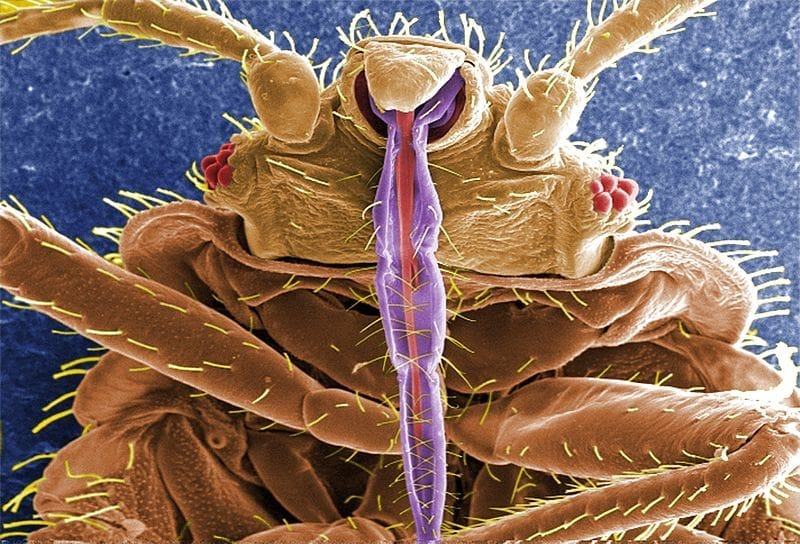
Bed bugs are actually pretty amazing little critters! Here are some quick facts for you:
- Bed bugs can survive for up to a year without food, particularly when it is cold. They can survive temperatures ranges down to around –32C and up to 45C. When it is cold, they go into a sort of hibernation, and pop out of it when it warms up.
- In the right conditions it takes one pregnant adult female six months to create an infestation of literally hundreds of thousands of bugs. She is bloody awesome at hiding in the meantime.
- When it gets warmer, bed bugs reproduce faster. This is why bed bug issues are often commonly associated with warmer countries. In higher temperatures, the reproductive cycle goes from 21 days down to as fast as 8 days.
- Bed bug sex is not a fun thing for the bed bug female. It involves carapace piercing in order to get the necessary fluids inside her. If I was a bed bug girl, I’d want to go bite someone, too.
- Bed bugs like other bed bugs. They secrete a pheromone that attracts more bed bugs. Sociable little chaps.
- Bed bugs are bigger than you might think, particularly in their adult stage, which they reach after five junior stages. And I thought one go at puberty was tough. They grow up to 0.5cm long, easily visible by the naked eye, in their adult stage at least.
- They are attracted to their victims by carbon dioxide and warmth, amongst other things.
- Bed bugs love travelling almost as much as you do. They or their eggs will happily hitch a ride in your clothes or on your backpack, and then hop off when they reach somewhere new and exciting with fresh fields of blood filled meat to suck on. This makes eradicating them a bit tricky in a well visited bed!
Which Countries Have Bed Bugs?
The reality is that pretty much every temperate to warm country will have bed bugs. So you’ll find bed bugs in Thailand, bed bugs in Australia, bed bugs in the USA, bed bugs across Europe – the list goes on. Basically, every continent except Antarctica has bed bugs!
It’s also a worsening problem it seems as we are travelling more and more, and our climate seems to be providing warmer days.
These two factors combine to produce the ideal conditions for bed bugs to spread, and for bed bugs to breed!
How to know if you’ve been bitten by bed bugs
People react to bed bug bites, like any other bites, in different ways. You may have been munched upon countless times, and have absolutely nothing to show for it, or you may come up in horrific pustules, blisters, or bumps that look just like mosquito bites. Diagnosis can be tricky! Additionally, for some reason, elderly people barely react at all.
The easiest way to tell though is the classic line pattern that the bed bug leaves behind. This will be a nice straight line of red bumps, that looks like something has methodically chewed you up. And that would be because something has methodically chewed you up!
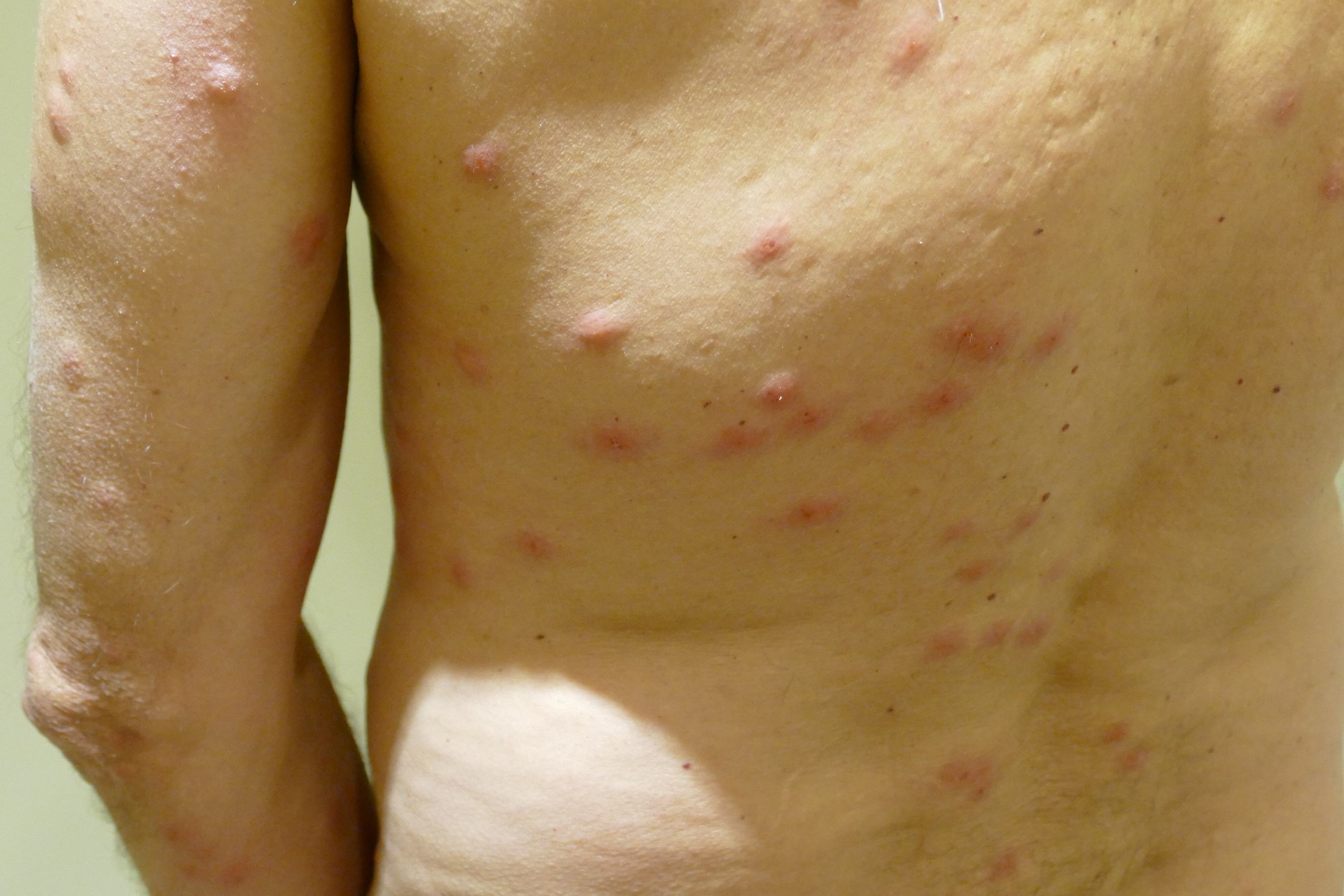
Often this will be a line of three bumps, sometimes more, depending on a variety of factors, including whether or not the bug was disturbed during the meal, or if the bug didn’t quite find what it was looking for on the first, second, third.. or.. well, you get the idea.
Bed bug bites can also take a while to appear after you’ve been bitten, sometimes up to a couple of weeks. Which makes working out what bit you and when fairly difficult. Very often, you will discount the bites as nothing more than mozzie bites, and move on with your life.
Bed bugs also tend to bite in areas that aren’t covered, however in tropical areas you’re not likely to be sleeping in much anyway. They also don’t usually target armpits or the back of your knees.
How to spot bed bugs in your hotel room or bed – the warning signs!
There is a bit of a misconception that for a place to have bed bugs, it needs to be dirty, or unkempt, or messy. This isn’t the case – the hostel I worked in for example was absolutely fanatic about cleanliness and bed bug management, and we still had the odd bug.
Of course, if your chosen accommodation doesn’t care too much about basic things like cleanliness or tidiness, then you can be pretty damn sure that they aren’t that bothered about bed bugs either. So the two can be linked, even if one doesn’t cause the other.
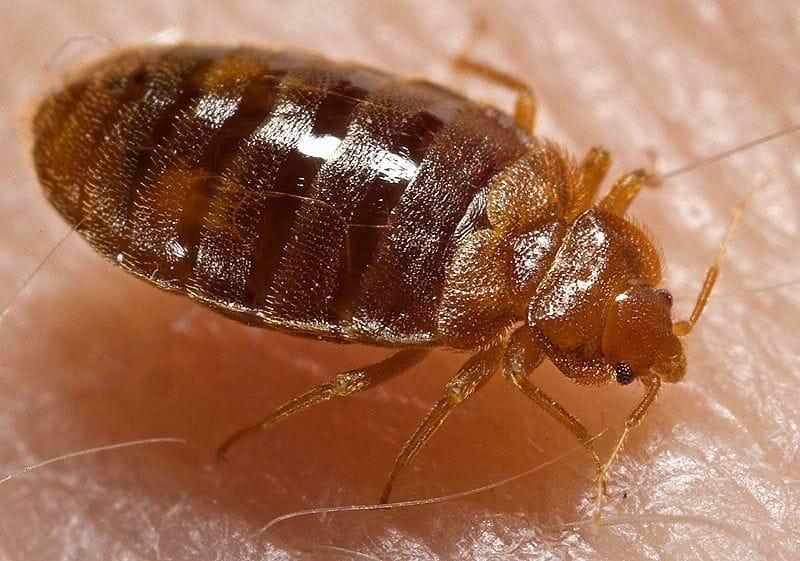
So how to tell if you might not be sleeping alone? Here are some ways to spot bed bugs:
- Bed bugs are fairly shy and retiring creatures. They mostly come out at night. In the daytime they like to hide, not too far away from their evening meal. Obvious places to look therefore include in your bed frame, and anywhere near the bed that harbours cracks that they can squeeze into. Curtain rails, skirting boards, door frames – even the heads of screws. You get the idea.
- Bed bugs secrete a black gooey substance. You might find this on the bed sheets after you have been bitten. You can also look for it on the bed frame. Lots of black goo around a hole or crack indicates the likely presence of our friends. If it is recent, you will be able to easily smear it with your fingers.
- Bed bugs have a distinctive aroma, which is how they attract other bed bugs. It’s a bit like the smell of a stink bug.
- Bed bugs have six different sizes, from the super tiny to the fairly large. So there are a variety of body shapes and sizes to look out for.
- Bed bugs are not excited by heat or excess amounts of carbon dioxide. If you think there are bed bugs in a hole, you could try breathing into it, or blowing a hair dryer into it on a low setting. This may force them out of hiding, or boil them in their shells. Whichever works for you. It may also distribute bed bug eggs all over the room.
- You may find blood stains on the bed after you’ve been bitten. However, you can get these with any bite, so it’s not a guarantee of bed bugs.
What to do if you think you’ve been bitten by bed bugs
If you think you have been bitten by bed bugs in a hotel or other accommodation, the first thing is not to panic. Whilst the bites can be itchy and annoying, bed bugs are not currently known to carry any actual diseases.
So in that sense, you are better off having been bitten by a bed bug than a mosquito.
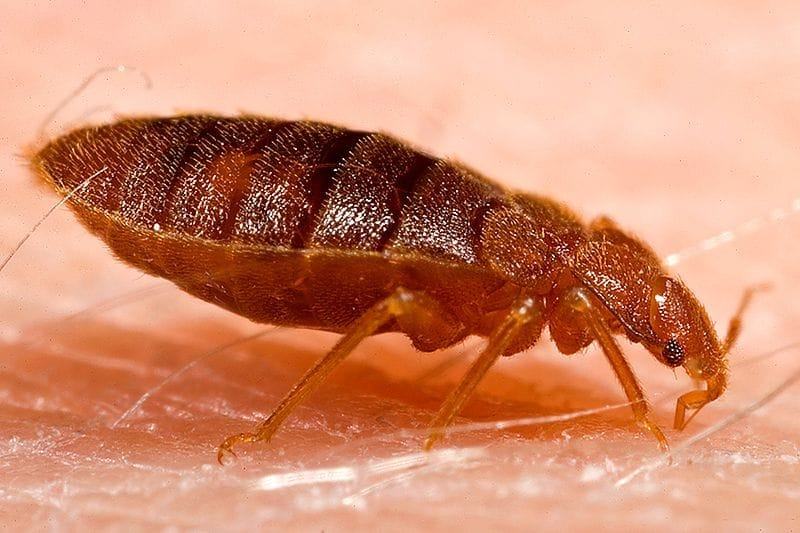
You should, of course, mention to your host that you think you have been bitten. There are two main reasons to do this:
- If the problem is with the place you are currently at, then they need to know so that they can do something about it
- If you were bitten somewhere else, there is a possibility that you have brought the eggs or bugs with you. They therefore need to keep an eye out for future problems. Be aware that they are unlikely to thank you for this.
When you inform your host, a variety of things will happen. It is very likely that, even if the accommodation believes itself to have bed bugs, it will deny this. Admitting to having bed bugs is akin to admitting you have the plague, due to the bad reputation these critters carry.
So, unless you have the dead body to prove your case, don’t expect too much in the way of liability being admitted.
Additionally, as the bites can take so long to come up, the accommodation provider may actually have a point, in that you could have brought a problem into their previously clean environment. This is a great way to make you feel guilty and thus shut you up. After all, who is going to tell their friends that they may be a carrier of bed bugs?
What you should see, if they are at all bothered / professional / caring are some efforts by the accommodation provider to find any problems.
Where I worked, if someone seemed to have an issue, we would take their room apart, literally. Bed frames would be disassembled, and any bugs we found would be squished. We also used a heat gun to sterilise cracks in wood or metal. However, if we found bugs or eggs, this was never disclosed to guests.
How to Treat Bed Bug Bites
Treating bed bug bites is much the same as treating any other bites. The application of topical anti-histamine creams or ingestion of anti histamine is about the best you can do. A bite is a sign of an allergic reaction, and anti-histamine can help.
Try not to scratch the bites – your nails are dirty and this will lead to infection.
If you have reacted particularly badly, then get yourself down to the doctors where they may be able to help out with more powerful creams or pills.
Ultimately though, it’s going to be a waiting game where you’ll just have to wait for the bites to subside.
How to Prevent Bed Bugs
If you are travelling, as previously mentioned, it can be hard to prevent bed bugs as you are not in control of the situation.
However, you can stop yourself from taking bed bugs home, and take preventative measures in your home.
The first thing you’ll want to do when travelling is to get used to inspecting the accommodation you are staying in for bed bugs. If there are signs of bed bugs, you should ask for another room, or consider another property. If the room has bed bugs, it is very likely that some of these bugs might get into your luggage, and that you will take them home with you.
If you are staying in a room where you can keep your luggage off the floor, such as on a luggage stand, then it’s a good idea to use this as it can keep any bugs out of your luggage.
You also can take some preventative measures like spraying your luggage with one of the bed bug sprays mentioned further on in the post. You might also want to invest in a heating device which will heat your luggage up above a temperature which kills bed bugs, thus sanitizing your belongings.
For your home, we would suggest investing in mattress covers for your beds. This stops bed bugs getting into the mattress, which is one of the most common places for them to hide. It also means you don’t need to discard of your mattress if you do get bed bugs, which can be costly if you have a nice mattress. See here for another well reviewed mattress protector.
The main thing to consider is how bed bugs might get into your property. The most common ways are for you to bring them back from a trip in your luggage, or for guests to bring them when they visit. Mattress covers can help in guest rooms, and careful inspection of your guests room after they leave is also a wise idea.
Another common vector for bed bugs is through furniture. We would advise against buying second hand furniture for this reason, as it can be very hard to tell if it is home to bed bugs.
There are a range of other products to help you deal with bed bugs in the home. These include electronic ultrasonic repelling devices, bed bug traps for your bed legs, and diatomaceous earth, which is a non-toxic substance that kills insects.
How to Get Rid of Bed Bugs
The bad news about bed bugs is that in a well visited environment like a hostel or hotel, it is pretty much impossible to eradicate bed bugs.
This is because even if you were able to find and kill every last egg, nymph and adult from the premises, all it takes is one new arrival with a pregnant adult female to turn up, and the problem starts all over again. In a warm climate where the bugs can breed quickly, the problem is only going to be worse.

In such an environment, the best that can be done is to try to manage and stay on top of the problem. Regular inspections of sleeping areas, blocking up inviting cracks and the occasional use of some sort of anti-bed bug chemicals are the best that can be done so that the issue stays small – akin to a few mosquitoes flying in through a window at night, rather than spiralling out of control into a serious infestation.
Speaking of chemicals, another problem arises. The most effective chemicals for properly killing off the whole bed bug lifecycle are also not exactly human friendly.
Fumigating a room is actually therefore more hazardous to human health than a few bites is ever going to be – and in fact more people have probably died from reactions to the anti bed bug chemicals than from actual bed bug bites. However, there are some non-toxic options, one of which I have listed below.
Products to help you deal with Bed Bugs
There are some products you can get to help stop that most nightmare of all situations – taking the bed bugs from your travels to your home, as well as other sprays for killing bugs generally.
- EcoRaider is one of the better natural options for killing bed bugs. This is available from the manufacturer, and also on eBay here. In a study by the US Entomological Society of America, this was the only natural bed-bug killing product that effectively killed both bed bug nymphs and bed bug eggs
- The other recommended product from the above study is this Bed Bug Spray by Bed Bug Patrol, available on Amazon. This was also successful against bed bugs. It’s also highly rated by commentators, as well as being both organic and non-toxic.
- This is another well rated natural product available on Amazon
- Electronic repellers like this work by emitting ultrasonic sounds to deter a range of insects, including bed bugs
- There are a wealth of other options also available from both Amazon.com and UK.
- This Travel Sized Luggage Spray by Bed Bug Patrol on Amazon.com is designed to help protect you from bringing the bed bugs back from your travels – possibly the worst outcome of any bed bug encounter!

If you do have a problem in your home, it is likely that you will have to call in professionals to fully clean out your house. They will use all sorts of nasty chemicals, and you will probably have to move out for a while. That is the only way to really sort out the problem once and for all.
And that is that for bed bugs! If you’ve got any comments, questions or experiences to share from your travels, including horrific photos, don’t be afraid to share them below! Otherwise happy travels, and remember, sleep tight.. don’t let the bed bugs bite!
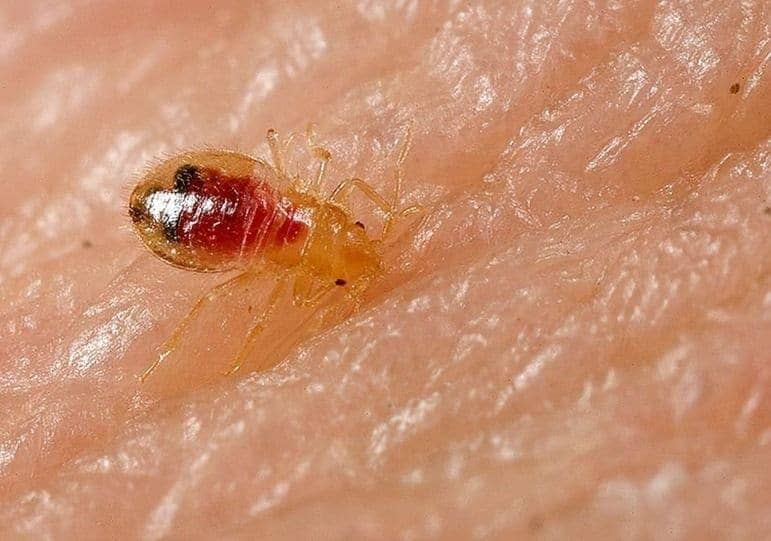
Jana says
Hi, thanks so much for this article! I will be taking a trip to Spain and Morocco and will be staying in multiple hotels. We now will be checking the mattress and sheets but since these bugs are great at hiding, I am afraid we may miss them. Would it be productive to spray the mattress and/or sheets with the sprays you have suggested as a preventative or just in case we didn’t actually see them? I was so excited about this trip but am now getting very anxious about it because of these uninvited guests!! I appreciate any info you can give me!!
Laurence Norah says
Hi Jana,
So first of all I wouldn’t really worry about it. We never check mattresses or sheets when we travel and we’ve not had any problems in hundreds of stays around the world. I’m not sure if spraying with the products would help, I’m not sure the chemicals used are that human friendly and personally I’d not want to lie in them! But it’s up to you.
Safe travels, enjoy Spain and Morocco 🙂
Laurence
A says
Does regular bug spray kill them? I’ve gotten bit in Sarajevo and no clue where to find bed bug spray for my luggage.
Laurence Norah says
As far as I know, no it doesn’t. They are tough critters to kill!
Nicole says
I have read all sorts of post about bedbugs and none of them say anything about bedbugs being in your vehicle so my question is if you Go to someone’s house for a couple hours that has bedbugs and then get in your vehicle are you and your vehicle contaminated
Laurence Norah says
Hi Nicole,
It’s hard to answer this. Bedbugs are more likely to be transported on luggage rather than people, so if you don’t take anything into the house, it is unlikely they will jump on you and then into your car and then on into your house. And as there isn’t a source of food in the car, it’s not an attractive place to live for them either. So I would say that the chances are low, but not impossible of course.
Best
Laurence
srikant says
Thank you for telling a blog about dealing with bed bug as traveler. It is very much a serious issue. The information provided is very relevant.
Laurence Norah says
Thank you 🙂
Alana says
Great tips on how to clean a room with suspected bugs – would love some recommendations for those who have been bitten in hotels and are now fearful of bringing them home! I am covered in bed bug bites after backpacking through South America and now am terrified I will introduce them to my own bed and have no idea what to do!
Laurence Norah says
Hey Alana!
So the only thing that really works is heat – bugs can’t handle temperatures higher than 117F – 122F. So your best option is to wash everything you can (clothes, bag etc..) at a high heat. If you have items you can’t heat to that temperature, the safest option is to throw them out 🙁
Sorry I can’t be of much more help!
Laurence
Millie Cox says
So i am one of those people that thought you could only get bed bugs from people who are freaking nasty and never clean thier houses! Turns out i was wrong. WAY wrong. i got it from a trip to what should have been Paradise!!! i have been scouring the internet for ways to kill them and i have tried almost everything! i just read http://toomanyadapters.com/ces-2014-best-rest/ so i am hoping a bed bug heater will work. anyone try one before? suggestions? thanks so much